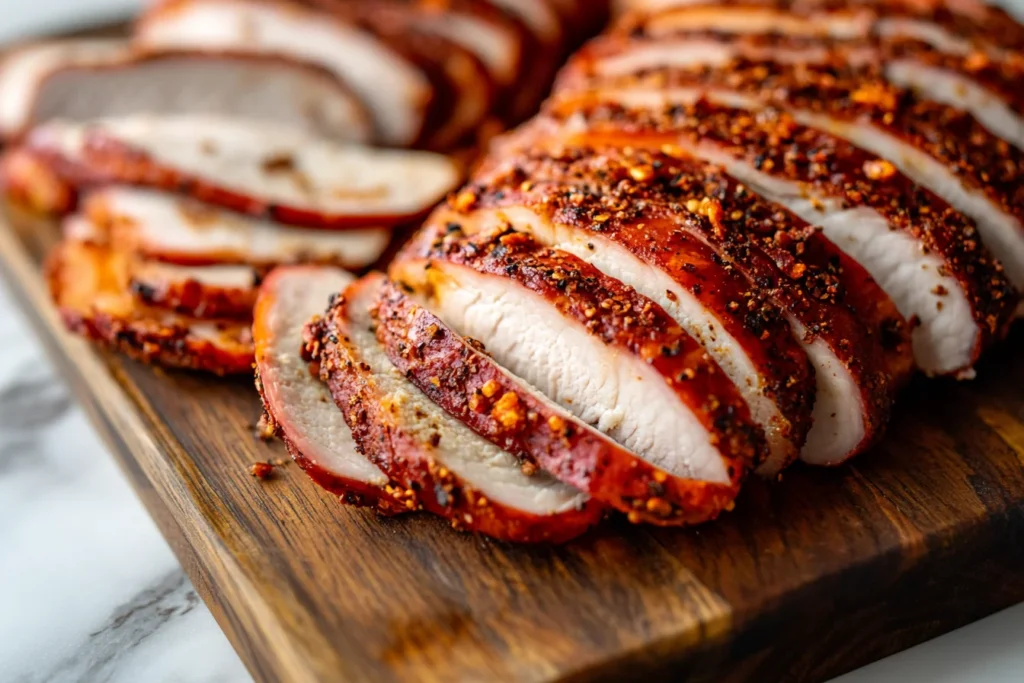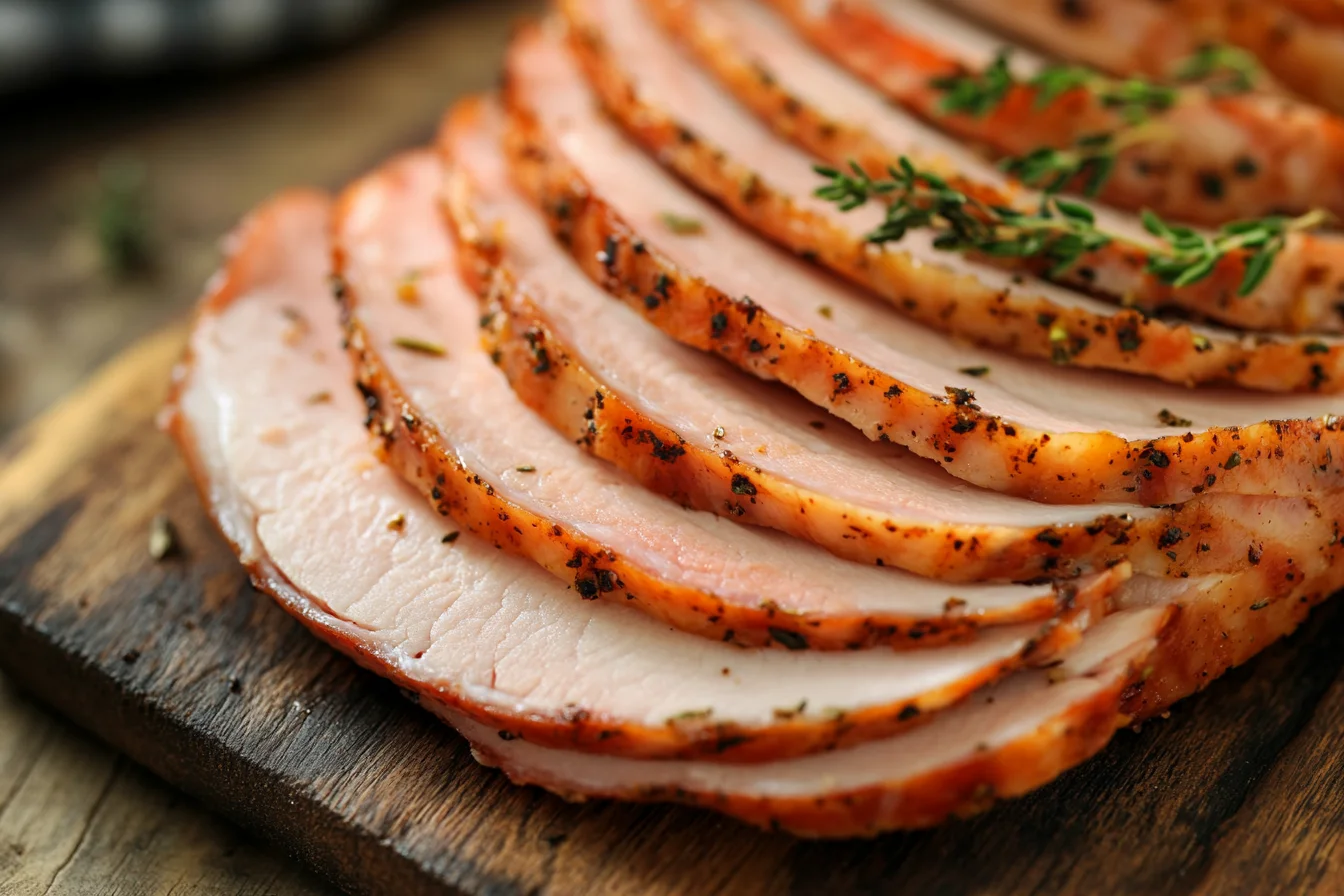Is Turkey Pastrami Good to Eat? Turkey pastrami has become a sought-after alternative to traditional deli meats, particularly for those seeking healthier or lighter options. This lean, protein-rich meat offers a delightful combination of flavor and versatility. But is it good for you? In this comprehensive guide, we will explore the nutritional value, health benefits, potential drawbacks, and various ways to enjoy turkey pastrami. Additionally, we’ll answer frequently asked questions to help you decide if it’s a worthwhile addition to your diet.
Table of Contents
What Is Turkey Pastrami?
At its core, turkey pastrami is a seasoned and smoked deli meat made from turkey breast. Moreover, it’s cured with spices like black pepper, coriander, garlic, and paprika, giving it a bold and savory flavor. The preparation process is similar to traditional beef pastrami, but the use of turkey makes it leaner and often lower in calories and fat.
How Is Turkey Pastrami Made?
The process of making turkey pastrami involves:
- Curing: The turkey breast is soaked in a brine solution, which typically contains salt, sugar, and spices. This step enhances flavor and preserves the meat.
- Seasoning: A spice rub featuring black pepper, coriander, and paprika is applied to the surface.
- Smoking: The seasoned turkey is smoked to develop its characteristic flavor.
- Cooking: Finally, the meat is fully cooked, ensuring it’s safe to eat without additional preparation.
Types of Turkey Pastrami

- Pre-packaged slices: Convenient for sandwiches and snacks.
- Whole cuts: Ideal for slicing at home or using in recipes.
- Low-sodium varieties: Great for those watching their salt intake.
Nutritional Profile of Turkey Pastrami
A deeper understanding of turkey pastrami’s nutritional content can help you decide how it fits into your diet. Furthermore, it’s important to know how it compares to other meats in your pantry.
Macronutrient Breakdown
Per 1-ounce serving:
- Calories: ~39
- Protein: ~4.5 grams
- Fat: ~1.2 grams
- Carbohydrates: ~0 grams
Micronutrient Content
- Vitamin B6: Vital for brain health and energy production.
- Niacin (Vitamin B3): Helps convert food into energy.
- Phosphorus: Supports bone health.
- Zinc: Enhances immune system function.
Therefore, these attributes make turkey pastrami a nutrient-dense choice, especially for those seeking a low-fat protein source.
Additional Nutritional Insights
In addition to its core nutrients, turkey pastrami is free from trans fats and provides a clean source of energy. Its high protein content ensures long-lasting satiety, making it a staple for those on high-protein diets. Moreover, it is naturally low in carbohydrates, making it suitable for keto and low-carb diets.
Health Benefits of Turkey Pastrami
Incorporating turkey pastrami into your meals can offer several advantages. Not only does it provide essential nutrients, but it also offers convenience for those on the go.
1. Low in Fat and Calories
Compared to beef pastrami or other deli meats, turkey pastrami is significantly lower in fat and calories. This makes it an excellent option for weight management or maintaining a heart-healthy diet. Moreover, its reduced calorie content supports dietary goals.
2. High-Quality Protein
Protein is essential for building and repairing tissues, maintaining muscle mass, and supporting overall health. Turkey pastrami provides a lean protein source without excessive fat or calories. Consequently, it can be an ideal post-workout snack.
3. Rich in Essential Nutrients
The vitamins and minerals in turkey pastrami support energy production, immune function, and overall well-being. For instance, B vitamins like niacin and B6 play a crucial role in metabolism and neurological health. Furthermore, its zinc content enhances the immune system.
4. Convenience
Pre-sliced turkey pastrami is a quick and easy addition to sandwiches, salads, and wraps, making it a practical choice for busy lifestyles. Additionally, it pairs well with fresh vegetables for a balanced meal.
5. Low Cholesterol Alternative
Compared to many other deli meats, turkey pastrami is relatively low in cholesterol, making it a suitable choice for those with specific dietary restrictions. This aspect also benefits individuals managing cardiovascular health.
6. Versatility
Its savory and smoky flavor pairs well with a variety of dishes, allowing it to shine in salads, wraps, and hot meals. Moreover, its flavor profile complements diverse cuisines.
7. Weight Management
The high protein content in turkey pastrami helps regulate appetite by promoting a feeling of fullness. This makes it easier to control calorie intake throughout the day. Furthermore, its low-fat content supports calorie-conscious eating.
8. Kid-Friendly Option
For parents looking to introduce healthier lunchbox options, turkey pastrami offers a flavorful alternative to processed snacks or high-fat meats. Its mild flavor appeals to children, making it easy to incorporate into meals. In addition, its portability makes it a convenient snack.
9. Suits Various Diets
Whether you’re following a high-protein, keto, or low-fat diet, turkey pastrami can be a versatile and compliant addition. Furthermore, its adaptability enhances its appeal for meal planning.
Potential Drawbacks of Turkey Pastrami

While turkey pastrami has many benefits, it’s important to consider the following potential drawbacks:
1. High Sodium Content
Like many processed deli meats, turkey pastrami can be high in sodium. Excessive sodium intake is linked to high blood pressure and increased risk of cardiovascular diseases. Opt for low-sodium varieties or consume in moderation to mitigate this issue. Additionally, balance it with fresh, whole foods.
2. Preservatives and Additives
Commercially prepared turkey pastrami often contains preservatives like nitrates and nitrites, which some studies have associated with health risks. To avoid these additives, look for natural or organic brands. Moreover, consider making your own version at home.
3. Allergen Risks
Certain spice blends or curing agents used in turkey pastrami production may contain allergens. Always check ingredient labels if you have dietary sensitivities. Furthermore, consult brands that clearly label allergen-free products.
4. Not Ideal for Low-Sodium Diets
Even with low-sodium options, those on strict low-sodium diets should carefully monitor portions to avoid exceeding their daily limits. Therefore, pair it with naturally low-sodium foods.
5. Cost
Some premium brands of turkey pastrami can be more expensive than other deli meats, which might be a consideration for budget-conscious shoppers. Additionally, buying in bulk may reduce costs.
6. Environmental Concerns
Some consumers may prefer locally sourced or sustainably produced options. While turkey farming has a smaller environmental impact compared to beef, it’s still important to consider the sourcing of your meat products. Moreover, supporting ethical brands can address this concern.
Is Turkey Pastrami Good for Weight Loss?
Yes, turkey pastrami can be a great choice for weight loss due to its high protein and low-fat content. Protein promotes satiety, helping you feel full for longer, which may reduce overall calorie intake. Furthermore, it supports muscle preservation during weight loss.
However, it’s crucial to monitor portion sizes and consider sodium intake, especially if you’re consuming other processed foods.
Incorporating Turkey Pastrami into a Weight-Loss Diet
- Pair turkey pastrami with fiber-rich vegetables in salads or wraps.
- Opt for whole-grain bread to increase satiety when making sandwiches.
- Limit additional salty condiments to control sodium intake.
- Use turkey pastrami as a protein source in calorie-controlled meal prep recipes.
- Combine turkey pastrami with low-calorie dips like Greek yogurt or hummus for a balanced snack.
- Substitute it for higher-calorie meats in recipes to lower overall dish calories.
How Does Turkey Pastrami Compare to Other Deli Meats?
1- Turkey Pastrami vs. Beef Pastrami
- Calories: Turkey pastrami is lower in calories.
- Fat: Turkey pastrami has less fat, making it a leaner option.
- Flavor: While turkey pastrami is milder, it retains a smoky, spiced flavor.
2- Turkey Pastrami vs. Turkey Breast
- Preparation: Plain turkey breast is unseasoned and unsmoked, offering a more neutral flavor.
- Sodium: Turkey pastrami typically has higher sodium content due to the curing process.
- Convenience: Sliced turkey pastrami is ready-to-eat, while plain turkey breast may require cooking or seasoning.
3- Turkey Pastrami vs. Ham
- Sodium Levels: Ham is often saltier than turkey pastrami.
- Calories: Turkey pastrami tends to have fewer calories per serving.
- Healthier Profile: Turkey pastrami’s lower fat content makes it the better choice for heart health.
4- Turkey Pastrami vs. Roast Beef
- Fat Content: Roast beef often contains more fat than turkey pastrami.
- Taste Profile: Roast beef is richer and more robust, while turkey pastrami has a spicier, smoky flavor.
- Protein Levels: Both offer high protein, but turkey pastrami is leaner overall.
5- Turkey Pastrami vs. Salami
- Fat and Calories: Salami is much higher in fat and calories compared to turkey pastrami.
- Flavor: Salami has a more intense, spiced flavor, while turkey pastrami offers a subtler taste.
- Health Considerations: Turkey pastrami’s lower fat and sodium content make it a more health-conscious choice.
Is Turkey Pastrami Good to Eat? Creative Ways to Enjoy Turkey Pastrami
Sandwich Ideas
- Classic Deli Sandwich: Combine turkey pastrami with rye bread, mustard, and pickles.
- Turkey Pastrami Club: Layer with lettuce, tomato, and turkey bacon on whole-grain bread.
Salads
- Pastrami Cobb Salad: Add chopped turkey pastrami, hard-boiled eggs, avocado, and blue cheese to mixed greens.
- Mediterranean Salad: Toss turkey pastrami with cucumbers, tomatoes, feta, and olives.
Snacks and Wraps
- Roll-Ups: Wrap slices of turkey pastrami around cheese sticks or roasted vegetables.
- Protein-Packed Wraps: Fill a whole-grain tortilla with turkey pastrami, hummus, and fresh spinach.
Breakfast Options
- Turkey Pastrami Omelette: Fold chopped turkey pastrami into eggs with your choice of vegetables.
- Pastrami Breakfast Wrap: Wrap scrambled eggs, turkey pastrami, and avocado in a tortilla.
Dinner Dishes
- Pastrami-Stuffed Peppers: Fill bell peppers with a mixture of turkey pastrami, quinoa, and vegetables.
- Turkey Pastrami Stir-Fry: Sauté with broccoli, carrots, and soy sauce for a quick, healthy meal.
- Turkey Pastrami Pizza: Use as a topping along with mozzarella and fresh basil on a whole-grain crust.
Appetizers and Party Foods
- Turkey Pastrami Skewers: Pair with cherry tomatoes, mozzarella balls, and basil on toothpicks.
- Mini Pastrami Sliders: Serve on small buns with mustard and pickles for a crowd-pleasing snack.
Advanced Recipes
- Pastrami Mac & Cheese: Add diced turkey pastrami to a creamy mac & cheese recipe for a smoky twist.
- Stuffed Pastrami Mushrooms: Use small mushrooms filled with cream cheese and diced turkey pastrami as a savory appetizer.
Frequently Asked Questions
1. Do Turkey and Pastrami Go Together?
Yes, turkey and traditional beef pastrami can be paired for a flavorful combination in sandwiches, wraps, or charcuterie boards. Their contrasting textures and flavors create a satisfying culinary experience. Learn more
2. Is Turkey Pastrami Already Cooked?
Yes, most commercially prepared turkey pastrami is fully cooked and ready to eat. It can be served cold or heated, depending on your preference. Learn more
3. Is Pastrami Made from Turkey?
Traditional pastrami is made from beef, but turkey pastrami is a variation that uses turkey meat, prepared similarly to its beef counterpart. Learn more
4. How Should Turkey Pastrami Be Stored?
Store turkey pastrami in an airtight container in the refrigerator. Consume within 3-5 days of opening for maximum freshness.
5. Can You Freeze Turkey Pastrami?
Yes, turkey pastrami can be frozen. Place it in an airtight container or freezer bag, and consume within 1-2 months for the best quality.
6. What Are the Best Pairings for Turkey Pastrami?
- Cheeses: Provolone, Swiss, or cheddar.
- Breads: Rye, whole grain, or sourdough.
- Condiments: Mustard, aioli, or pesto.
7. Can Turkey Pastrami Be Used in Meal Prepping?
Yes, turkey pastrami is an excellent choice for meal prepping. Its long shelf life and versatility make it easy to include in a variety of dishes for the week.
8. How Does Turkey Pastrami Fit into a Balanced Diet?
When consumed in moderation and paired with fresh fruits, vegetables, and whole grains, turkey pastrami can contribute to a healthy and balanced diet.
Where to Buy Turkey Pastrami
You can find turkey pastrami at most grocery stores, delis, and online retailers. Look for:
- Low-sodium options for a heart-healthier choice.
- Organic or preservative-free brands if you prefer minimal additives.
Some popular brands include:
- Boar’s Head
- Applegate Farms
- Dietz & Watson
Conclusion
Turkey pastrami is a lean, flavorful alternative to traditional deli meats. With its high protein content and rich nutrient profile, it’s a convenient and nutritious choice for sandwiches, salads, and more. However, be mindful of sodium levels and opt for minimally processed varieties whenever possible.
Suggested Articles Links:


8 thoughts on “Is Turkey Pastrami Good to Eat?”